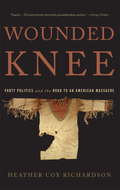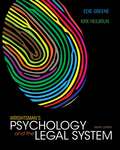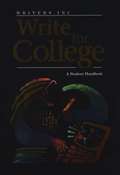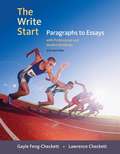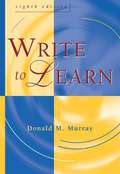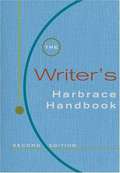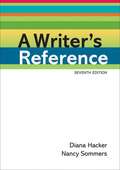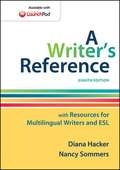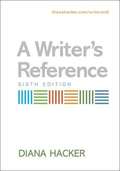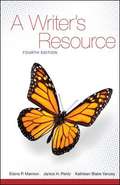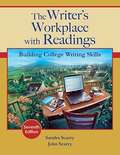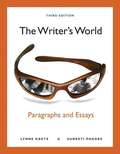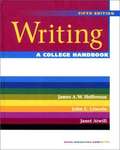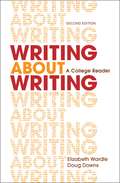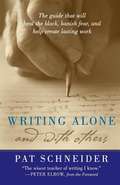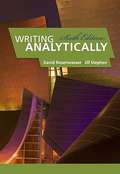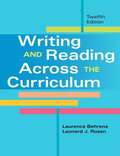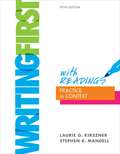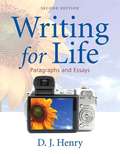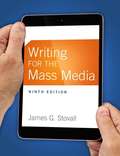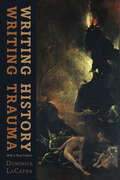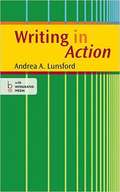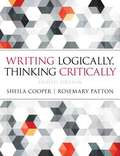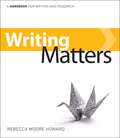- Table View
- List View
Wounded Knee: Party Politics and the Road to an American Massacre (Great Plains Photography Ser.)
by Heather Cox RichardsonOn December 29, 1890, American troops opened fire with howitzers on hundreds of unarmed Lakota Sioux men, women, and children near Wounded Knee Creek in South Dakota, killing nearly 300 Sioux. As acclaimed historian Heather Cox Richardson shows in Wounded Knee, the massacre grew out of a set of political forces all too familiar to us today: fierce partisanship, heated political rhetoric, and an irresponsible, profit-driven media. Richardson tells a dramatically new story about the Wounded Knee massacre, revealing that its origins lay not in the West but in the corridors of political power back East. Politicians in Washington, Democrat and Republican alike, sought to set the stage for mass murder by exploiting an age-old political tool-fear. Assiduously researched and beautifully written, Wounded Knee will be the definitive account of an epochal American tragedy.
Wrightsman's Psychology and the Legal System
by Edie Greene Kirk HeilbrunWRIGHTMAN'S PSYCHOLOGY AND THE LEGAL SYSTEM shows you the critical importance of psychology's concepts and methods to the functioning of many aspects of today's legal system. Featuring topics such as competence to stand trial, the insanity defense, expert forensic testimony, analysis of eye witness identification, criminal profiling, and many others, this best-selling book gives you a comprehensive overview of psychology's contributions to the legal system, and the many roles available to trained psychologists within the system.
Write for College: A Student Handbook
by Patrick Sebranek Verne Meyer Dave KemperWrite for College emphasizes the kinds of writing most often asked for in college courses. But the handbook covers much more than writing. It also provides information and guidelines for speaking, thinking, test taking, studying, researching, and nearly every other topic essential to success in college.
The Write Start: Paragraphs to Essays With Student and Professional Readings (Fourth Edition)
by Gayle Feng-Checkett Lawrence CheckettTHE WRITE START: PARAGRAPHS TO ESSAYS introduces the developing writer to the basic elements necessary for writing effective essays in the academic environment. The Fourth Edition focuses first on writing paragraphs that express thoughts about a topic, then on expanding the topic to the longer essay format. These skills will help students communicate more effectively and prepare them for the rigors of their first college-level composition course.
Write to Learn (8th edition)
by Donald M. MurraySpeaking writer-to-writer to beginning and more experienced writers, Murray (University of New Hampshire) guides students through every step of the writing process, emphasizing that writing is a journey of discovery. In this eighth edition, there is new emphasis on learning to harvest ideas and connections before sitting down to write. There are new chapters on reviving a dead draft, and on Internet research. Individual, partner, and group activities are included.
The Writer's Harbrace Handbook (2nd Edition)
by Robert Keith Miller Cheryl Glenn Loretta Gray Suzanne Strobeck WebbThe second edition of this handbook for college students maintains its focus on the rhetorical demands of writing and its emphasis on writing in the disciplines.
A Writer's Reference
by Diana Hacker Nancy SommersA Writer's Reference, the most widely adopted handbook in the United States, continues to be groundbreaking in its simplicity, offering the right content in an accessible format. New coauthor Nancy Sommers's own research, campus travel, and classroom experience keep the handbook in tune with the needs of academic writers. In a trusted quick-reference format, the seventh edition delivers advice on all the right topics: working with sources, revising with comments, preparing a portfolio, and more. A Writer's Reference offers unprecedented flexibility with several versions to choose from -- a handbook that's truly at your service. Read the preface.
A Writer's Reference: with Resources for Multilingual Writers and ESL
by Diana Hacker Nancy Sommers Kimberli HusterThis version of the best-selling college handbook helps both resident and international students understand college expectations and develop strategies for improving their academic English and academic writing. Written by an ESL expert, this booklet includes plenty of helpful charts, activities, exercises, and model papers -- along with notes about where to find additional resources online and on campus.
A Writer’s Reference (6th edition)
by Diana HackerA Writer's Reference is the most widely adopted college handbook ever published. The new edition is available in a classic version that provides more help with academic writing, serves a wider range of multilingual students, and lends more support for college research -- all in an easy-to-use quick-reference format. Now for all the ways you teach your course, you can choose the classic version or choose from among 4 additional versions with varied content. A Writer's Reference with Exercises is tailor-made for classroom use or for additional grammar practice with 86 integrated exercise sets. A Writer's Reference with Writing in the Disciplines provides help for college writing beyond composition with advice and models in six academic disciplines. A Writer's Reference with Writing about Literature includes an entire tabbed section on interpreting and writing about works of literature, with two annotated student essays. A Writer's Reference with Extra Help for ESL Writers includes an entire tabbed section for nonnative speakers of English; it offers targeted advice and strategies for college writing and research.
A Writer's Resource: A Handbook for Writing and Research (Fourth Edition)
by Elaine P. Maimon Janice H. Peritz Kathleen Blake YanceyA Writer's Resource focuses on the most common assignments and writing situations students will encounter in and beyond college, helping them to meet the challenges of composing in different genres and media.
The Writer's Workplace with Readings: Building College Writing Skills (7th Edition)
by Sandra Scarry John ScarryFor more than 20 years, THE WRITER'S WORKPLACE has served the needs of more than half a million two- and four-year students as they have worked their way toward rewarding careers in a variety of fields. Sandra Scarry and John Scarry present writing instruction in a clear and inviting form, with step-by-step explanations to help build and maintain students' confidence in their writing. The result of many years of classroom teaching and research, this comprehensive and time-tested resource reflects the authors' understanding that students are unique individuals, with diverse backgrounds and interests that must be accounted for as they engage in the writing process.
The Writer's World: Paragraphs and Essays (3rd Edition)
by Lynne Gaetz Suneeti PhadkeThe Writer's World series was written to address the diverse needs of today's students: students whose first language is not English, students who respond favorably to visuals, and students who have varying skill levels.
Writing: A College Handbook (5th edition)
by James A. W. Hefferman John E. Lincoln Janet AtwillThe Fifth Edition exemplifies in clear, engaging prose the skills that students need to communicate in a wide variety of rhetorical contexts. A reliable and easy-to-use reference tool and an up-to-date rhetoric and research guide, Writing: A College Handbook invites students to discover the power of effective writing.
Writing about Writing: A College Reader 2nd Edition
by Elizabeth Wardle Doug DownsLiteracies : where do your ideas about reading and writing come from? -- Individual in community : how do texts mediate activities? -- Rhetoric : how is meaning constructed in context? -- Processes : how are texts composed? -- Multimodal composition : what counts as writing?
Writing Alone and With Others
by Pat Schneider Peter ElbowFor more than a quarter of a century, Pat Schneider has helped writers find and liberate their true voices. She has taught all kinds--the award winning, the struggling, and those who have been silenced by poverty and hardship. Her innovative methods have worked in classrooms from elementary to graduate level, in jail cells and public housing projects, in convents and seminaries, in youth at-risk programs, and with groups of the terminally ill. Now, in Writing Alone and with Others, Schneider's acclaimed methods are available in a single, well-organized, and highly readable volume. The first part of the book guides the reader through the perils of the solitary writing life: fear, writer's block, and the bad habits of the internal critic. In the second section, Schneider describes the Amherst Writers and Artists workshop method, widely used across the U. S. and abroad. Chapters on fiction and poetry address matters of technique and point to further resources, while more than a hundred writing exercises offer specific ways to jumpstart the blocked and stretch the rut-stuck. Schneider's innovative teaching method will refresh the experienced writer and encourage the beginner. Her book is the essential owner's manual for the writer's voice.
Writing America: Language And Composition In Context AP* Edition
by David A. Jolliffe Hephzibah RoskellyWe have designed Writing America: Language and Composition in Context AP* Edition so that it can be used as the foundational text in a course that emphasizes reading, writing, and analyzing texts. Writing America teaches reading as a dynamic, interactive process. It teaches writing as a craft, related to reading, that produces rich, purposeful, well-planned and well-executed texts. It teaches the structure and organization of texts, at the level of both the whole text and the sentence. It couches this instruction in an examination of vitally important works of American literature, art, and culture, accompanied by a study of contemporary pieces that unpack current thinking on the issues and themes raised by the historical works.
Writing Analytically (6th Edition)
by David Rosenwasser Jill StephenRosenwasser and Stephen (Muhlenberg College, Allentown, PA) show undergraduate students in first-year writing courses, as well as those in more advanced writing-intensive courses in various subjects, how to learn to analyze information and use writing to discover and develop ideas. They explain how to become more observant and push observations to implications and conclusions; use evidence, evolve claims, and converse with sources to write analytical papers; and understand organization, disciplinary formats, introductions and conclusions, and grammar and style. Writing exercises that can be applied to print and visual, text-based, and experiential materials are included, as are tips from professors on differences in disciplines other than English, rhetoric, or composition. This edition has a new introductory chapter previewing key topics, more examples, and more lists and rationales. It has two toolkit chapters on analytical methods instead of one, some reorganization and reformatting, more description of discipline-specific writing (especially the natural and social sciences), and new material in chapters on form. It has new sections on Rogerian argument, practical reasoning, and figurative logic, and expanded treatment of the four documentation styles. It clarifies step-by-step instructions, uncovering assumptions, and the method of looking for patterns of repetition and contrast. Another edition of the book includes readings. Annotation ©2012 Book News, Inc. , Portland, OR (booknews. com)
Writing and Reading Across the Curriculum (Twelfth Edition)
by Laurence Behrens Leonard J. RosenRemaining one of the best-selling interdisciplinary composition texts for over twenty-five years, Writing and Reading Across the Curriculum helps readers learn to write effectively for college.
Writing First With Readings: Practice In Context
by Laurie G. Kirszner Stephen R. MandellBest-selling authors and veteran college writing instructors Laurie Kirszner and Stephen Mandell believe that students learn to write best when they use their own writing as a starting point. In Writing First with Readings: Practice in Context, designed for the paragraph to essay course, Kirszner and Mandell take seriously the ideas and expressive abilities of developmental students, as well as their need to learn the rules of writing and grammar. Visual writing prompts that open every chapter get students writing immediately. By moving frequently between their own writing, writing models and instruction, and workbook-style mastery exercises, students get constant reinforcement of the skills they are learning. Thoughtful chapters on college success, research, and critical reading, along with high-interest essays, round out the text, making it the perfect introduction to college writing.
Writing For Life (Second Edition)
by D. J. HenryD. J. Henry wrote Writing for Life from the ground up for today's college student. The ground-breaking approach of combining instruction and visual tools makes writing, reading and thinking processes visible, and shows the processes rather than just telling students about them. Highly graphic layouts and unique visual pedagogy empower students to transfer the learning strategies they already use in interpreting the visual world to the task of writing.
Writing For The Mass Media (Ninth Edition)
by James G. StovallA clear and effective introduction to media writing Writing for the Mass Media offers clear writing, simple organization, abundant exercises, and precise examples that give students information about media writing and opportunities to develop their skills as professional writers. With a focus on a converged style of media writing, and converting that style into real work, this ninth edition maintains its classic and effective text/workbook format while staying ahead of the curve and preparing students for their future careers. MyCommunicationLab is an integral part of the Stovall program. MediaShare allows students to post speeches and share them with classmates and instructors. Interactive videos provide students with the opportunity to watch and evaluate sample speeches. Online self-assessments and pre- and post-tests help students assess their comfort level with public speaking and their knowledge of the material.
Writing History, Writing Trauma (Parallax: Re-visions of Culture and Society)
by Dominick LaCapraAn updated edition of a major work in trauma studies.Trauma and its aftermath pose acute problems for historical representation and understanding. In Writing History, Writing Trauma, Dominick LaCapra critically analyzes attempts by theorists and literary critics to come to terms with trauma and with the crucial role post-traumatic testimonies—notably Holocaust testimonies—assume in thought and in writing. These attempts are addressed in a series of six interlocking essays that adapt psychoanalytic concepts to historical analysis, while employing sociocultural and political critique to elucidate trauma and its aftereffects in culture and in people. This updated edition includes a substantive new preface that reconsiders some of the issues raised in the book.
Writing In Action
by Andrea A. LunsfordAndrea Lunsford’s research treats student writers as writers first—not only in the classroom, but in every aspect of their lives. Her newest handbook features a simple and inviting design that helps students find solutions for every situation as they translate their skills as writers in their day-to-day lives to the conventions of solid academic writing. Featuring the writing process coverage of larger handbooks at a value price, Writing in Action is a supportive reference that emphasizes rhetorical strategies that help students put their ideas into action.
Writing Logically, Thinking Critically
by Sheila Cooper Rosemary PattonThis concise, accessible text teaches students how to write logical, cohesive arguments and how to evaluate the arguments of others. Integrating writing skills with critical thinking skills, this practical book teaches students to draw logical inferences, identify premises and conclusions and use language precisely. Students also learn how to identify fallacies and to distinguish between inductive and deductive reasoning. Ideal for any composition class that emphasizes argument, this text includes coverage of writing style and rhetoric, logic, literature, research and documentation.
Writing Matters: A Handbook for Writing and Research
by Rebecca Moore HowardWriting Matters unites research, reasoning, documentation, grammar and style in a cohesive whole, helping students see the conventions of writing as a network of responsibilities writers have.
